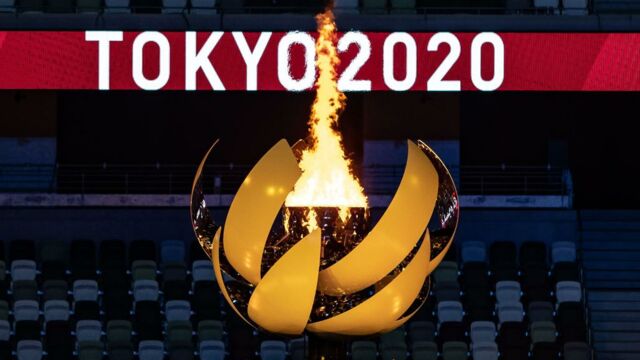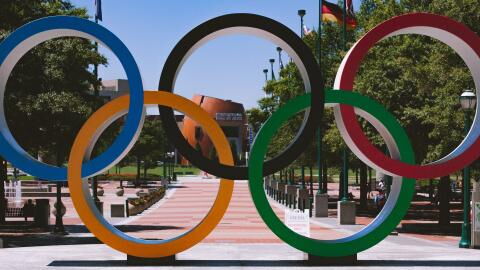Tokyo 2020 has finally kicked off, albeit a year later than planned. But as the city welcomes the long-awaited athletes, COVID cases are rising. So far, at least eight athletes have had to withdraw after testing positive after arriving in Japan, and no doubt more competitors will fall sick before the Olympics’ end. But what kinds of safety measures are in place to stop competitors from catching the virus?
Discover our latest podcast
Tokyo 2020 began with an elaborate opening ceremony performed to nobody but a stadium full of cameras, a sight not unfamiliar in the pandemic climate. But spectator-less arenas are just one of the many COVID measures in place to protect Olympians from coronavirus (you may have already heard about the sex-proof beds).
COVID tests
Olympic COVID protocols for competitors begun before they even touched down on the tarmac. Before arriving in Japan, competitors needed to provide not one but two negative PCR tests, one 96 hours and one 72 hours before departure. Then competitors, staff, press and coaches all had to undergo saliva tests, waiting in the airport until they received a negative result. If the saliva tests came back positive, the person would either need to isolate or go to the hospital for treatment.
Athletes will also be required to download a location-enabled contact tracing app and limit their movements to specific bubbles.
Despite the importance placed on coronavirus safety measures, athletes are not required to be vaccinated, and standards apply equally to everyone regardless of vaccination status.
Village and hotel restrictions
Once in Tokyo, athletes need to undergo COVID PCR tests each day before 10am. And, if they’re staying within the Olympic village, competitors will also have their temperature taken each time they return.
Athletes are sharing rooms in the village this year, but to make things a bit safer, they are required to sanitise regularly and be wearing a mask at all times unless eating, sleeping, training or competing.
According to GB Long Jumper Jazmin Sawyers - who took to TikTok to document her Olympic experience - if staying in a hotel, Olympians are confined to specific spaces and are forbidden from interacting with civilian guests. They are also required to be wearing masks around the clock.
Jazmin revealed: ‘There is hand sanitiser absolutely everywhere and you have to wear masks at all times unless you're eating or training. When you're eating, you have to eat behind these plastic screens, and it is also not allowed to serve yourself food.’
@jazminsawyers Team GB run a tight ship! Here’s how we stay COVID safe at the Team GB prep camp in Japan. Heading into the Olympic village next week!
♬ original sound - Jazmin Sawyers
During their stay in Japan, athletes are also not allowed to take public transport and must only travel from their accommodation to Olympic approved venues in the provided vehicles. If competitors fail to adhere to the rules, they could face various consequences, including being disqualified from the games.
Competing
During the 2020 Olympics, if an athlete wins a medal, they will be required to place it over their own necks. Then, once the competitor has finished their final event, they will be required to leave the country within 48 hours.
Sports-related restrictions have also been put into place, requiring things like clapping over verbally shouting or cheering on teammates.
If a competitor tests positive for coronavirus, they will not be allowed to compete and will immediately need to go into isolation, the duration of which will be determined by officials on a case-by-case basis.
The IOC has also set out regulations in case of a positive test during a group event or a knockout round. However, three main points apply across all events:
- Athletes will not be disqualified for a positive COVID test. Instead, they will be given a ‘Did Not Start’ (DNS) status if they are ruled unable to compete.
- The IOC guidelines also state: ‘The minimum result of the athlete/team will be protected, considering the phase of competition at which they could not compete.’
- If an athlete or team cannot compete, the next most eligible competitor or team will step in to allow events to go on as planned.















